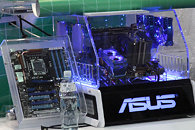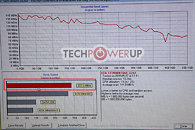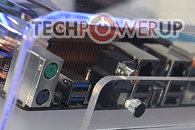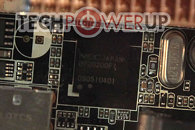- Joined
- May 14, 2004
- Messages
- 27,842 (3.71/day)
| Processor | Ryzen 7 5700X |
|---|---|
| Memory | 48 GB |
| Video Card(s) | RTX 4080 |
| Storage | 2x HDD RAID 1, 3x M.2 NVMe |
| Display(s) | 30" 2560x1600 + 19" 1280x1024 |
| Software | Windows 10 64-bit |
At the booth of ASUS we found a motherboard that supports the brand-new SATA 6 Gbit/s standard that was released just a few days ago. ASUS prepared a running demo that showcases the performance differences between SATA-II and SATA-III.


The main improvement of SATA III is that it doubles the available bandwidth again, to reach 6 Gbit/s. While no current mechanical harddrives can reach such speeds, there are several SSDs out there that can saturate a 3 Gb/s link. Other improvements include an optional smaller connector for 1.8" devices and improvements to Native Command Queuing (NCQ). By the way, the official name is "SATA 6 Gbit/s", not "SATA III" or "SATA 3.0", yes I know I got it wrong in this post.
Edit Jun 02:
I got you those screenshots with the performance numbers. As you can see the HDTach benchmark shows a burst speed of over 300 MB/s which is evidence that SATA 6 Gb is working on that motherboard. Due to the HDD used (Seagate ST3500410AS) the actual read bandwidth is far below that because the HDD is just too slow to even saturate SATA-II.


Another novely on this motherboard is support for the USB 3.0 standard. Since the chipset does not offer USB 3.0 support, ASUS has chosen to use an NEC 720200 USB 3.0 interface chip.
View at TechPowerUp Main Site


The main improvement of SATA III is that it doubles the available bandwidth again, to reach 6 Gbit/s. While no current mechanical harddrives can reach such speeds, there are several SSDs out there that can saturate a 3 Gb/s link. Other improvements include an optional smaller connector for 1.8" devices and improvements to Native Command Queuing (NCQ). By the way, the official name is "SATA 6 Gbit/s", not "SATA III" or "SATA 3.0", yes I know I got it wrong in this post.
Edit Jun 02:
I got you those screenshots with the performance numbers. As you can see the HDTach benchmark shows a burst speed of over 300 MB/s which is evidence that SATA 6 Gb is working on that motherboard. Due to the HDD used (Seagate ST3500410AS) the actual read bandwidth is far below that because the HDD is just too slow to even saturate SATA-II.


Another novely on this motherboard is support for the USB 3.0 standard. Since the chipset does not offer USB 3.0 support, ASUS has chosen to use an NEC 720200 USB 3.0 interface chip.
View at TechPowerUp Main Site
Last edited:






 " hahaha J/K
" hahaha J/K


